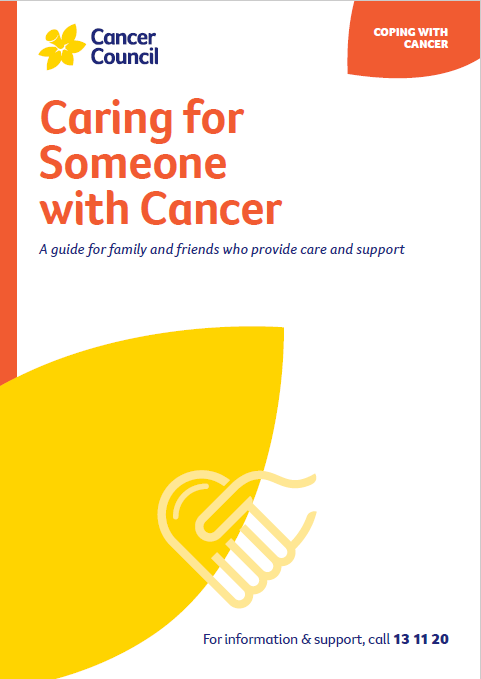- Home
- About Cancer
- Supporting someone with cancer
- Caring for someone with cancer
- Your role as a carer
- Providing medical care
- Managing medicines safely
Managing medicines safely
The person with cancer may be taking several different medicines throughout the day. These may be non-prescription and/or prescription medicines. It is common for carers to provide help with medicines.
Learn more about:
Questions to ask your doctor
It is important to use medicines safely. Knowing the answers to the following questions can help save time and confusion.
Ask the doctor or pharmacist:
- What is the name of each medicine and what is it for?
- How much should be given (the dose) and when?
- How should each medicine be given (e.g. with or without food)?
- Is there anything, such as alcohol or driving, that should be avoided while taking the medicine?
- Does the medicine interact with other prescription or over-the-counter medicines, vitamin supplements or complementary therapies?
- Are there any possible side effects?
- What should I do if the person has side effects?
- How long will the medicine be needed? Will the dose be reviewed?
- What should I do if a dose is missed?
- When is the use-by date, and where is it on the medicine packaging?
- How should the medicine be stored?
- What should I do with any unused medicine?
Let the person’s health care team know about any side effects. They may be able to adjust the dose or change the medicine.
Ways to manage medicines
It can be hard to remember what medicines you need to give to the person you are caring for. There are different ways to help ensure you give the correct dose at the right time.
Keep a medicines list
A medicines list can help you keep track of the person’s medicines, what each one is for and when it should be given. It can also help health professionals understand which ones are being used, which is important in an emergency. You can:
- create your own list on paper or online
- ask their doctor or pharmacist for a list
- download the MedicineWise app onto your tablet or smartphone to create a medicines list and set medicine reminders.
Get help from the pharmacist
The pharmacist can prepare a blister pack (e.g. Webster-pak), which arranges all the doses that need to be taken throughout the week. They may also sell containers you can use to organise pills by the day and time they should be taken. The pharmacist can keep prescriptions on file to make it easy to get repeats made up. As well as paper prescriptions, doctors can provide electronic prescriptions.
If the person has a lot of electronic prescriptions, talk to the pharmacist about registering for an Active Script List – visit digitalhealth.gov.au to learn more.
Track prescriptions
When you fill the last repeat of a prescription, make a note to see the person’s doctor for another prescription. This helps ensure you don’t run out of medicines, particularly after-hours.
Visit healthdirect.gov.au/medicines to find information about specific medicines or call 1300 MEDICINE (1300 633 424) to talk to a pharmacist.
I was actively involved with helping Mum use the oxygen machine, administering the liquid morphine for her when she was in pain, and making sure that she took the anti-anxiety medication.
Libby
→ READ MORE: Organising paperwork
Podcast: How to Help Someone with Cancer
Listen to more of our podcast for people affected by cancer
Dr Alison White, Palliative Medicine Specialist, Royal Perth Hospital, WA; Tracey Bilson, Consumer; Louise Dillon, Consumer; Louise Durham, Nurse Practitioner, Palliative Care Outpatients, Princess Alexandra Hospital, QLD; Katrina Elias, Carers Program, South Western Sydney Local Health District, NSW Health, NSW; Jessica Elliott, Social Worker, Youth Cancer Services, Crown Princess Mary Cancer Centre, Westmead Hospital, NSW; Brendan Myhill, Social Worker and Bereavement Research Officer, Concord Repatriation General Hospital, NSW; Penny Neller, Project Coordinator, National Palliative Care Projects, Australian Centre for Health Law Research, Queensland University of Technology, QLD; Olivia Palac, Acting Assistant Director, Occupational Therapy, Gold Coast University Hospital, QLD; Nicole Rampton, Advanced Occupational Therapist, Cancer Services, Gold Coast University Hospital, QLD; Shirley Roberts, Nurse Consultant, Medical Oncology, Northern Adelaide Cancer Centre, SA; Dr Elysia Thornton-Benko, Specialist General Practitioner, and UNSW Research Fellow, NSW; Kathleen Wilkins, Consumer; Helen Zahra, Carers Program, South Western Sydney Local Health District, NSW Health, NSW.
View the Cancer Council NSW editorial policy.
View all publications or call 13 11 20 for free printed copies.
